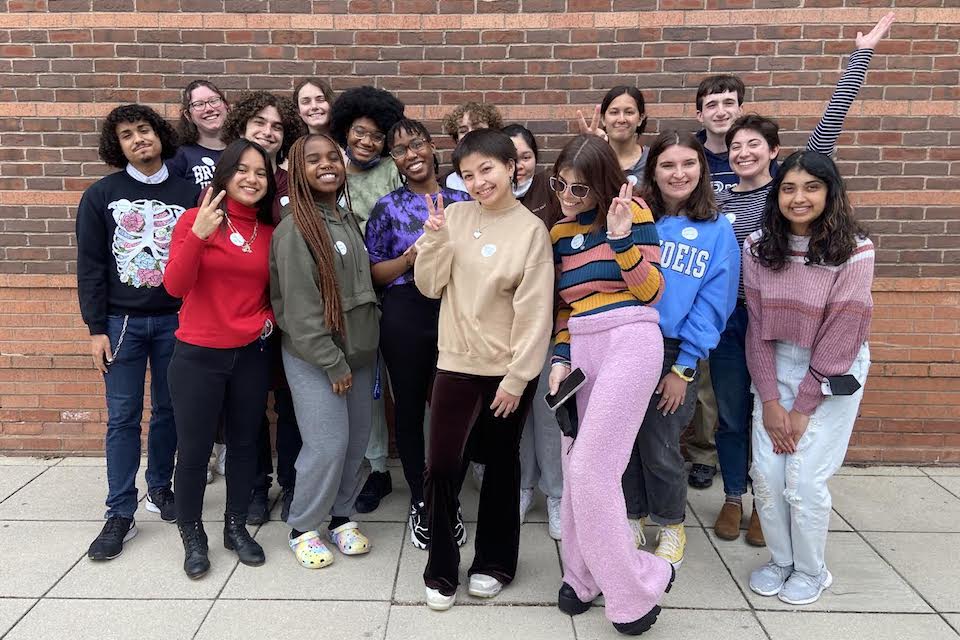Pride Reps: Building community while becoming mentors
 Courtesy, Eli Sobel
Courtesy, Eli SobelThe 2021-22 GSC Pride Reps.
This past year, a new pilot program at Brandeis turned a few part-time office jobs for students into a robust peer-to-peer mentoring program for conversations about gender and sexuality.
The Gender and Sexuality Center selected a cohort of 10 “Pride Reps,” who received weekly training during the fall semester before putting what they learned into action in the spring.
“One of the most invaluable parts of the college experience is the people you meet — the clubs, volunteer opportunities and programs like this,” said Julián Cancino, inaugural director of the Gender and Sexuality Center. “This program is about making sure that students have a community and that they can build community with each other.”
Training in the fall included hearing from outside speakers from LGBTQ+ organizations such as Keshet for LGBTQ+ Jewish Life, Fenway Health's LGBTQIA+ Aging Project, the History Project, and GLBTQ Legal Advocates & Defenders; and in-person training on how to put intersectionality theory into action, affirm others’ identities, have dialogues across differences and share open conversations with their peers.
In the spring, they held weekly drop-in hours and informal one-on-one mentorship chats, where students could talk to Pride Reps about issues relating to gender and sexuality, no matter how big or small. Pride Reps also hosted community building events in collaboration with Queer Jews at Brandeis, Queer and Trans People of Color Coalition, and Triskelion, the first and longest-running LGBTQ+ student club at Brandeis. As the pilot program unfolded, the GSC saw student engagement increase by 233 percent.
What sets the Pride Reps program apart from other peer mentors is the introspective nature of its educational curriculum, according to Gender and Sexuality Center program administrator Eli Sobel, who oversaw the pilot program.
“At the GSC, we believe that understanding your relationships to your own identities is an essential foundation for supporting others through their personal development,” Sobel said.
The Pride Reps’ training consisted of months of self-reflection and seminar-style discussions before the students opened up their mentorship services to the greater Brandeis community.
“The level of empathy, insight and vulnerability that our Pride Reps shared during training blew me away,” Sobel said. “It makes me confident that they are prepared to be the most effective, self-aware, and genuine peer mentors that they can be.”
Maggie Hastings '22 was a student-worker in the GSC during her sophomore and junior years. When the Pride Reps pilot program started, she was able to bear witness to the positive changes happening at the GSC.
“It was a fascinating new experience. We learned so much, and we were hands-on in our own education and learning,” Hastings said. “Being an office worker in the GSC was great, but it was much more passive than what we did as Pride Reps.”
The program also created new friendships and bonds amongst students, Hastings said.
“I have gained so much community from Pride Reps,” Hastings said. “People I would not have met otherwise, or people I would have maybe met in a class and never seen again. I gained a greater understanding of others, along with a deeper understanding of some important topics.”
The program is the latest step in transforming the Gender and Sexuality Center from a student-run, student-facing campus organization into an institutional commitment with professional staff creating services for women and LGBTQ+ students, faculty and staff. Cancino took over as the inaugural director of the center in 2020. Since then, the GSC has instituted new inclusive policies on campus, established a university-wide process for collecting gender and sexuality data, and implemented training for faculty and staff.
“The GSC is open to everyone,” Cancino said. “We are a resource for the entirety of the Brandeis community.”
The Pride Reps program will continue as a pilot in the coming academic year, and plans are in the works to make it a permanent mentorship program. Future plans include a deeper collaboration with Brandeis faculty and the Waltham community.
“We see it as a mentorship program in that we are building the knowledge of future mentors to other students,” Cancino said. “It matters that students aren't left on their own to have these conversations. Our students need our support and guidance.”
Categories: Student Life





